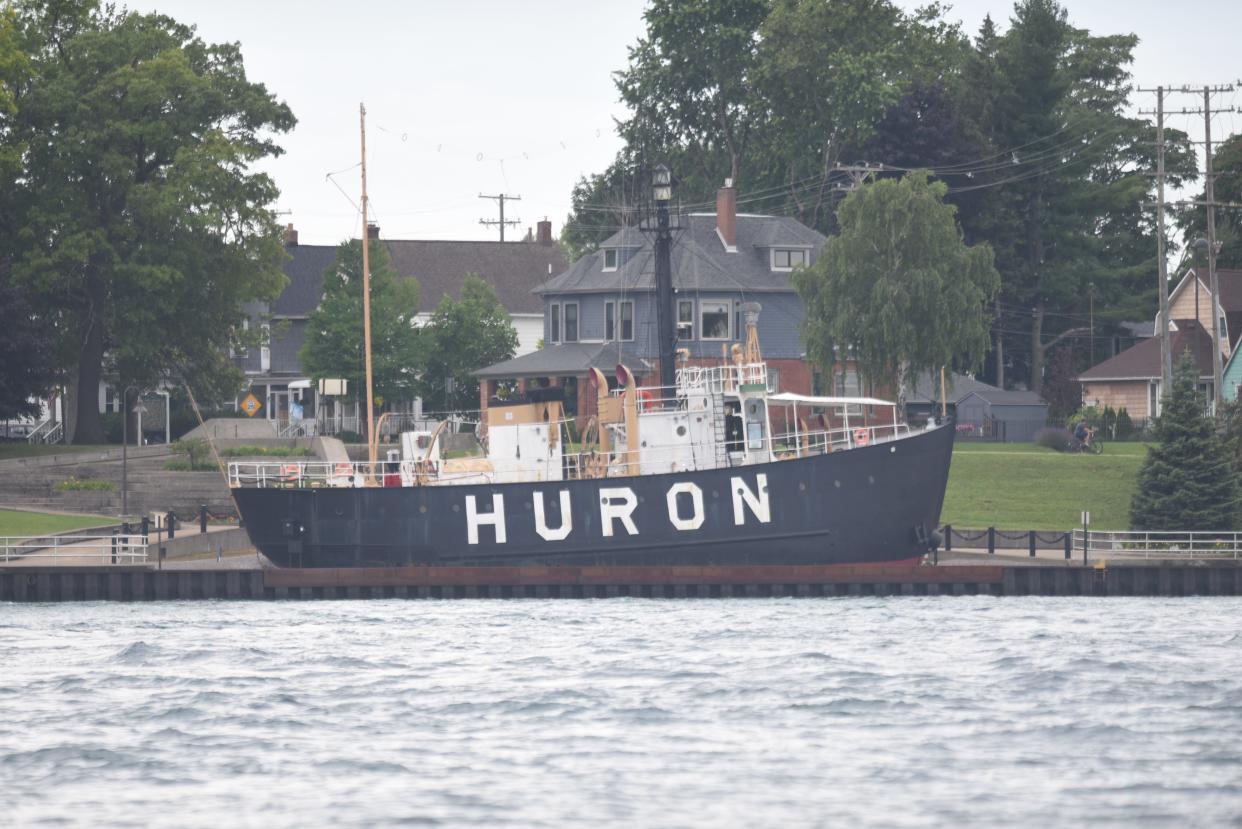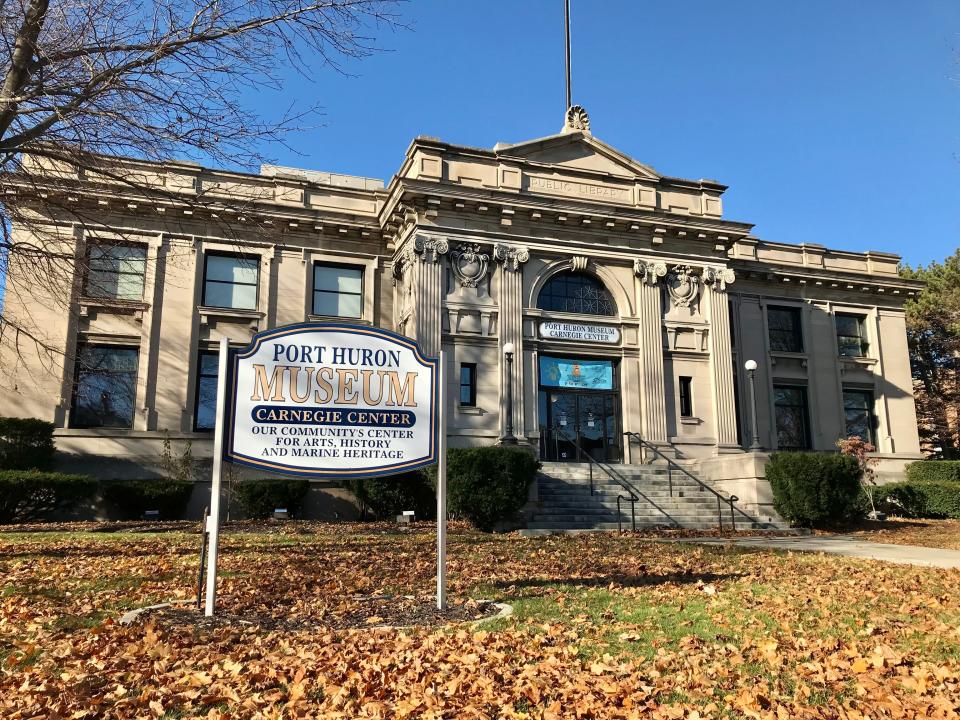County board rejects putting museum's tax proposal on ballot

The St. Clair County Board of Commissioners rejected the idea of a county-wide tax to support and grow cultural services offered through the Port Huron Museums on Thursday.
Three other millage proposals that’d be on the August ballot, however, including an increase for county parks and recreation programming, are headed to the March 21 regular board meeting for final consideration.
The request from the museum was for 0.25 mills, or a roughly quarter-mill tax, which would’ve meant 25 cents per $1,000 of a property’s taxable value, and generating $1.8 million to $1.9 million annually over a six-year term.
Veronica Campbell, director of the museum nonprofit, told county commissioners that the funds would’ve introduced a grant and support program for other museums and historical organizations across the county, maintained and expanded staffing and museum offerings, and offered free admission to St. Clair County residents at its sites, including the Carnegie Center, Fort Gratiot Light Station, the Huron Lightship, and Thomas Edison Depot.
“Without this opportunity, we’d have to re-evaluate and scale back our operations,” she said. “We can either continue to grow and be a place envisioned for the entire county and an economic driver or we will stay small and not united (accommodating the region).”
Board Chairman Jeff Bohm and Commissioner Lisa Beedon were the only two to support moving the museum’s request to go on the Aug. 6 ballot to the full board.
“There’s a lot of millages that are going to come before us this evening (for) consideration to be placed on the ballot. I’ve always been a big proponent of letting the people vote on it,” Bohm said. “I’ve seen numerous things here in 20 years, and to be quite honest, some of them I have not supported at the voting box. But giving … people that are registered voters the opportunity to say yay or nay (is important), just kind of my two cents.”
Commissioners Steve Simasko, Dave Rushing, Dave Vandenbossche, and Joi Torello voted against it. Jorja Baldwin was absent.

Funds through museum tax aimed to accommodate countywide groups
The Port Huron Museums, known formally as the museum of arts and history, began operation in 1968.
It first offered free admission to some residents with the help of federal funds administered by the city of Port Huron post-COVID, later reupping the effort last summer for all visitors at multiple sites with the help of $50,000 from the city, $25,000 from the Blue Water Convention and Visitors Bureau, and $1,000 from Semco Energy.
That included the depot, Carnegie site, and lightship, though not tours of the light station property, which is operated in conjunction with St. Clair County Parks and Recreation and includes other facilities.
On Thursday, Campbell said the organization has proven to be “one of the biggest tourist attractions," adding, “We have seen unprecedented growth over the past few years and have grown to meet the demand for educational programming, accessibility and bringing in local exhibits. Last year in 2023, due to our free admission initiative, we saw over 56,000 visitors to all four of our sites.”
But she said the free admission as it is currently is “not a promised reoccurring program.”
Appearing with museum board member Michael Mytinger, Campbell briefly presented on their plans had the millage proposal moved forward.
In addition to free admission, those included free group tours for all schools in the county, and a push to work with 40 historical and cultural organizations in the area that’d be eligible to ask for some of $300,000 set aside, as well as help through the museum’s resources, staffing, and collections.
They’d also rebrand as the St. Clair County Regional Museum.
Commissioners questioned the finances of the museum as an organization – currently with an operating budget of roughly $800,000, as well as the under $400,000 that goes toward it’s four full-time staffers and 15 part-time seasonal employees.
“We’re already stretched as it is,” Campbell said, adding the spike in funding would’ve boosted personnel.
The county board also pushed back on how grants with $300,000 in taxpayer dollars to other cultural organizations would be administered by committee rather than elected government officials. Some members asked how many of the 40 listed eligible groups were interested.
“I had misgivings about it because it’s centralized to Port Huron,” Vandenbossche said. “And it’s more money from outside from my community to Port Huron, and there’s no guarantee it comes back.”
Mytinger, who also works as a purser with another group downriver, said, “Everyone we’ve spoken to said, 'We would be interested.'”
Rushing said he thought the proposal “might have a negative effect” on the outcome of other millages.
Simasko said he didn’t know enough about their financing and didn’t think the museum’s request was timely with the other requests heading for August’s ballot.
County Administrator Karry Hepting confirmed no other county tax went directly to nonprofits, though some services are run through third-party groups while funds are administered by local governments.
“I don’t want to go down the slippery slope of saying, ‘OK, this 501c3. Let’s just do them all,’” Simasko said. “Then, we’ve got 16 501c3s coming for millages.”
Other August millage requests move ahead
Commissioners moved ahead both a quarter-mill tax renewal for county road improvements, as well as another for 0.5598 mills for the county sheriff’s Drug Task Force. Each would be for a term of four years if approved.
The road millage would generate $1,887,407 in the first year. Officials said it could be used to match federal funds for larger projects through the county road commission.
Sheriff Mat King said the DTF tax, which has been in place in some form for decades, finances a 19-person department, including an undercover unit separate from his office and personnel in the prosecutor’s office, in addition to equipment.
“The work they do always bleeds over to other crimes,” he said. “… I always say in real straight talk, nobody puts a gun in somebody’s face and demands money for rent money. They do it because they’re addicted to drugs. So, the impact … it’s difficult to even measure. They do anywhere from 70 to 110 drug raids a year.”
The parks and rec millage has been at its current levied amount of 0.4944 mills since it was first adopted 29 years ago, and it expires in 2027.
Now, the county department is aiming to ask for an additional tax not to exceed the same amount for a six-year term, initially with an annual levied amount of $3,459,300.
With an operating budget currently at that amount, Parks and Rec Director Dennis Delor said 25%, or $864,000 annually goes back to local communities.
“What that means is since 1995, our residents in all of those districts, 33 local units of government, have received back in those communities over $19 million,” he said. “That is money that was collected in those areas and gone back to those areas. … We have a very unique millage in that we have a distribution program.”
Rushing said multiple townships in his district were against doubling parks and rec taxes and questioned how much of it will be used in local communities. He was the only one to vote against moving the parks and rec request.
Delor said there was a likelihood that some, such as Casco Township, were saving up to develop parks.
In addition to helping local communities finance local projects and park needs, the county millage program has also helped grow the number of county parks from one to eight with other efforts ongoing.
Delor said that includes 1,200 acres and 65 different facilities with what he called “higher-end amenities.” And repeatedly, he said the current tax is well supported.
Citing both the three parks projects before the county board seeking American Rescue Plan funds this month, as well as the high interest in the state’s SPARK grant program, Delor said there was a big demand for more parks funding.
Simasko said he thought the parks and rec millage would pass and that it's well administered.
“Of all the things we get taxed on, this is the one thing that warms my heart," he said.
County commissioners meet again at 6 p.m. March 21 in the county meeting chambers at the county administration building, 200 Grand River Ave., in Port Huron.
Contact Jackie Smith at (810) 989-6270 or jssmith@gannett.com.
This article originally appeared on Port Huron Times Herald: County board rejects putting museum's tax proposal on ballot

